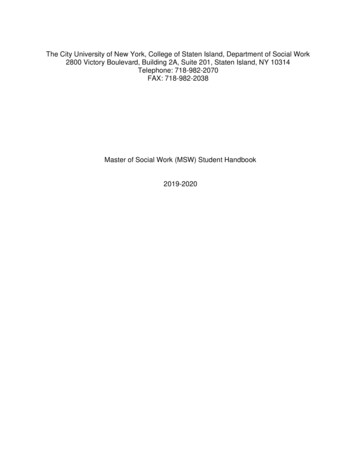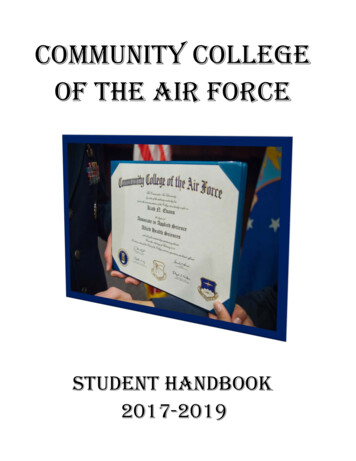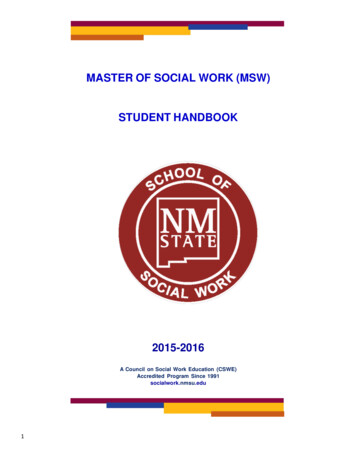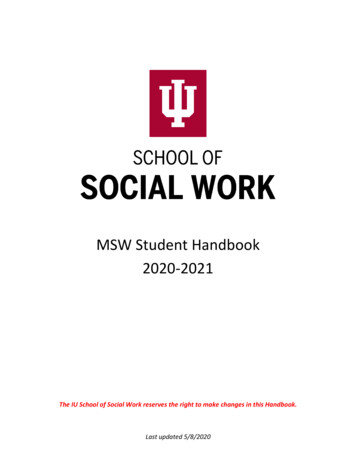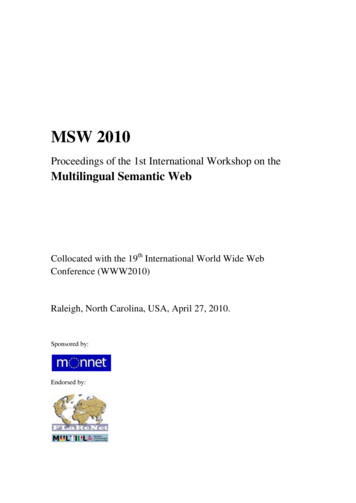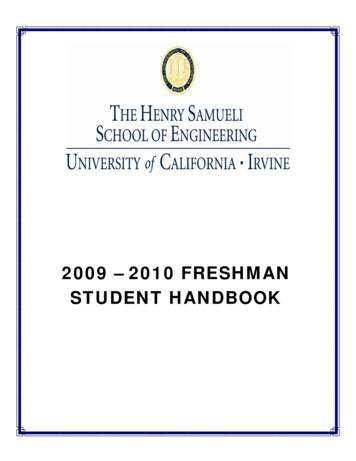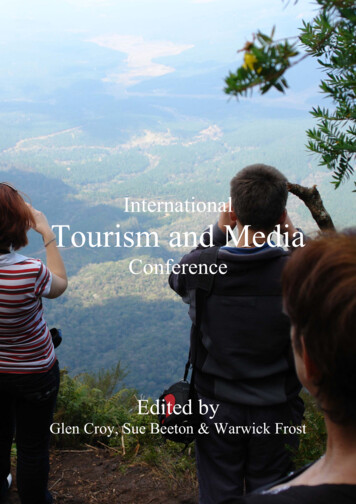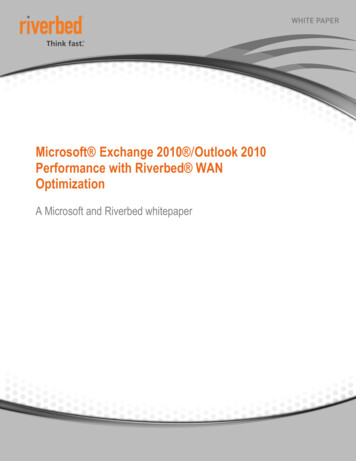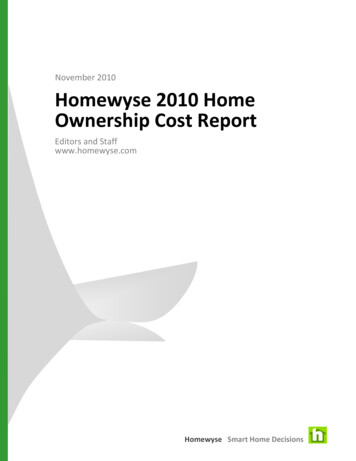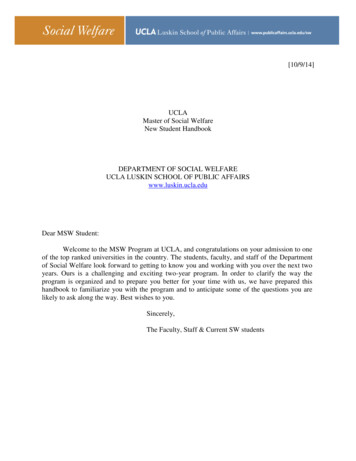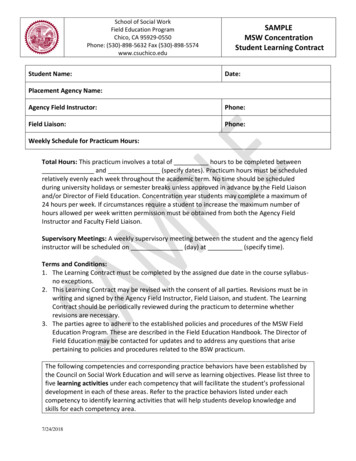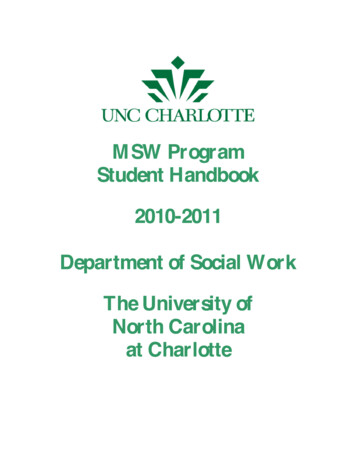
Transcription
M SW ProgramStudent Handbook2010-2011Department of Social WorkThe University ofNorth Carolinaat Charlotte
1Department of Social Work Full-Time FacultyDr. Dennis Long, PhD, Professor, Department ChairDr. Mark Ezell, Ph.D., Professor, MSW Program CoordinatorDr Jeffrey K. Shears, Ph.D., BSW Program Coordinator & Associate ProfessorMs. Susan Marchetti, MSW, LCSW, Field CoordinatorMs. Gay Jordan, MSW, LCSW, Coordinator of Admissions & Student ServicesMs. Amy Barsanti, MSW, Field Assistant CoordinatorDr. A. Suzanne Boyd, Ph.D., ACSW, Assistant ProfessorDr. John R. Doherty, Ph.D., MSW, LCSW, LecturerDr. James R. Dudley, Ph.D., LCSW, Professor EmeritusDr. Robert Herman-Smith, Ph.D., MSW, Assistant ProfessorDr. Shanti Kulkarni, Ph.D., Assistant ProfessorDr. E. Othelia Lee, Ph.D., MSW, Associate ProfessorMs. Terri Matthews, MSW, LecturerDr. Susan McCarter, Ph.D., MSW, Assistant ProfessorDr. Diana Rowan, Ph.D., MSW, LCSW, Assistant ProfessorDr. M. Lori Thomas, Ph.D., MSW, Assistant ProfessorDepartment Address and Contact I nformationThe University of North Carolina at CharlotteCollege of Health and Human ServicesDepartment of Social Work9201 University City BoulevardCharlotte, North Carolina 28223-0001Phone: 704-687-7938; FAX: 704-687-2343Website: http://socialwork.uncc.edu/files/msw student handbook.pdfPolicies in this handbook are applicable to all graduate students in the Department of SocialWork. In addition to this handbook, students should refer to the University of North Carolinaat Charlotte Graduate Catalog, Graduate Handbook and the College of Health and HumanServices Student Handbook2002Revised: September 2006, December 2007, September 2010
2Table of ««««««««««««««.5Mission of the Social Work e MSW «««««5Phi Alpha ««««6The Program «««6,QWHUSHUVRQDO 3UDFWLFH � .6Field of Practice ««.7Educational «««««7Foundation ProgrDP vanced PracticH :ULWLQJ LQ WKH 06: �.9 �««««««««.10Waiver ««««««.10Curriculum �««««.11Two Year (Full-Time) CuUULFXOXP 3ODQ«««««««««««««««.12Three Year (Extended Study) Curriculum PODQ««««««««««««13Advanced Standing Curriculum Plan«««««««««««««««14&RXUVH ««««««« 15Advanced «««« 18(OHFWLYH �««««.19Field �«««««««19The Practicum Planning 20The Practicum Student LearniQJ ion of Students in FieOG 3UDFWLFXP«««««««««««««««««.22
3North Carolina Child Welfare EducatLRQ &ROODERUDWLYH««««««««««««.22University Degree ««.23Transfer of �«««««24Minimum Hours and �«24&RPSUHKHQVLYH �«««247LPH �«««««««24*UDGLQJ 3ROLFLHV DQG *UDGH 3RLQW e Course Work«««««««««««««««««««««« 26Admission to �««« 26Application for thH « 265HTXLUHPHQWV IRU &RQWLQXHG HTXLUHPHQWV IRU �««276WXGHQW 3DUWLFLSDWLRQ LQ FDGHPLF H DQG 3URIHVVLRQDO 6WXGHQW H 6RFLDO :RUN .276WXGHQW �««««««28SWDQGDUGV IRU 6RFLDO :RUN Outline of «« 28Introduction to �29Criteria for Evaluating AcadHPLF 3HUIRUPDQFH«««««««««««« 29Basic �««««.30&RPPXQLFDWLRQ USHUVRQDO RJQLWLYH 0
43K\VLFDO 30Emotional and MentaO UHVV 0DQDJHPHQW«««««««««««««««««««« 30(PRWLRQDO DQG 0HQWDO RQDO 3HUIRUPDQFH ssionDO &RPPLWPHQW««««««««««««««««« 31Professional HOI «31(WKLFDO �.32Scholastic �««32Graduate 33Sources of ««33Accommodations for DiVDELOLWLHV«««««««««««««««««« 33Policies and Procedures for Review RI FDGHPLF 3HUIRUPDQFH«««««« 34Performance that May Result in ReYLHZ DQG RU 'LVPLVVDO«««««««« 34Three Levels of 35Level �«35/HYHO � 35Level �« 36Academic «« 37Procedures for Handling Academic *ULHYDQFHV««««««««««««« 37Non-Academic Grievances Standards for SociaO :RUN (GXFDWLRQ«««««.38NASW Code of «««.39Elective Form «««««« ««««««««««««««««««««««40
5I ntroductionThe University of North Carolina at Charlotte was established in 1965 by the North CarolinaGeneral Assembly that transformed Charlotte College, established in 1946, into a campus ofThe University of North Carolina. The Graduate School was established in 1985 with theappointment of the first Dean of the Graduate School, although graduate degree programshad been offered since 1969. Today more than 500 members of the Graduate Faculty andmore than 2,600 graduate students participate in a broad array of graduate programs at themaster's and doctoral levels and in graduate certificate programs.The College of Health and Human Services offers professionally recognized and accessibleundergraduate and graduate programs that are nationally and globally relevant, andresponsive to changing health care and human service needs in the state and region. TheCollege achieves excellence through informed and effective teaching in its degree programs,community partnerships, and professional activities and research to advance science andpractice in the health and human service professions.The Department of Social Work is one of five departments that comprise the College ofHealth and Human Services. The Department offers the Bachelor of Social Work degree andthe Master of Social Work degree.This MSW Student Handbook provides information about the Social Work Department andthe MSW degree. It should be used as a supplement to the current UNC Charlotte GraduateCatalogue, which may be accessed through the UNC Charlotte website(http://www.uncc/edu/gradmiss/grad cat). You should use this Handbook as a reference andguide throughout the time that you are a student at UNC Charlotte.M ission of the Social Work DepartmentThe mission of the Social Work Department at the University of North Carolina at Charlotteis:To prepare competent and effective social work professionals at bothbeginning generalist and advanced specialist levels, to develop social workknowledge, and to provide leadership in the development and evaluation ofservice delivery knowledge and evaluation of service delivery systems.7KLV PLVVLRQ ZLOO EH SXUVXHG ZLWK VSHFLDO DWWHQWLRQ WR WKH UHJLRQ¶V PRVW YXOQHUDEOH populations and with a commitment to, and vision of, a just and caring society, free ofprejudice and oppression.The M SW DegreeThe Master of Social Work (MSW) degree program at UNC Charlotte prepares students foradvanced social work practice with individuals, families, and small groups in public,voluntary, and proprietary human service settings. The program also prepares students toaddress many of the social and individual problems/needs of people, particularly low incomeand other vulnerable populations.
6Graduates of the MSW Program are eligible to pursue North Carolina StateLicensure/Certification at three levels: Licensed Clinical Social Worker, Certified MasterSocial Worker, and Certified Social Work Manager. Licensure/certification is managed bythe North Carolina Certification Board for Social Work. The Board may be contacted atwww.swboard.org or (800) 550-7009.Graduates of the Program may also qualify for licensure as a school social worker in the stateof North Carolina, a certification required for all who wish to practice in this field. TheSchool Social Work certification is awarded by the North Carolina Department of PublicInstruction. Certification as a school social worker is a complex process involving a numberof steps and requirements. Students interested in this certification should begin planning withtheir advisor as early in the program as possible, but certainly no later than the secondsemester.Phi AlphaPhi Alpha is an academic honor society for BSW and MSW students of excellence. NuTheta, the UNC Charlotte chapter of Phi Alpha, was founded in 2005. Its purpose is torecognize and advance academic excellence and scholarship in social work practice.Membership eligibility is open to MSW students who have completed at least 12 credit hoursWRZDUG WKH PDVWHU¶V GHJUHH LW LV EDVHG RQ DFDGHPLF H[FHOOHQFH RU KLJKHU *3 leadership ability, and a high standard of personal behavior and dedication to the social workprofession.The ProgramThe MSW program requires 60 hours of course work (42 hours for the Advanced Standingprogram) EH\RQG WKH EDFKHORU¶V GHJUHH IURP D UHgionally accredited institution. The full-timeprogram takes two years to complete, the extended program takes three years to complete,and the Advanced Standing program takes one full year to complete. The UNC CharlotteMSW Program is fully accredited by the Council on Social Work Education.I nterpersonal Practice ConcentrationAdvanced practice in the MSW Program is concentrated in the Interpersonal Practiceperspective. The Interpersonal Practice perspective is concerned with the transactionsbetween people with each other and their environments with respect to individuals, families,and groups. Interpersonal practice is also concerned with organizations and communities.The focus is on individuals, families, and groups, taking into account the effect thatorganizations and communities have on these smaller systems and upon the utility ofinterpersonal practice skills for work within organizations and communities. Interpersonalpractice seeks to enhance the functioning of individuals, families, and groups through theprevention or amelioration of social problems. Emphasis is on advanced assessment andproblem-solving with attention to client strengths and coping capacities. Goal-orientedintervention and evaluation of practice occurs within a context of professional social workvalues and ethics, social justice, and affirmation of the human rights of diverse groups ofpeople, especially those groups historically oppressed related to race, ethnicity, gender,sexual orientation, age, ability, and socioeconomic class.
7Field of Practice EmphasisIn addition to demonstrating advanced knowledge and skills in interpersonal social workpractice with individuals, families, and groups, students in the MSW program will developin-depth knowledge of a chosen field of practice. Students must select their field of practiceemphasis by the end of their first semester in the program. Content areas from whichstudents may choose their field of practice emphasis include the following: aging, familiesand children (including school social work), and health/mental health. Students willdevelop in-depth knowledge and skills in their selected field of practice in the followingways:1) Papers and projects completed after the first semester must be related to the field ofpractice emphasis;2) Elective courses will be selected to support the field of practice emphasis;3) The second year field practicum will be in a setting applicable to the field of practiceemphasis; and,4) Students will participate in an intensive capstone field of practice seminar (SOWK 7651)which will incorporate their field of practice emphasis in the development ofcomprehensive theoretical and methodological perspectives of practice paper during theirfinal semester of the program.Educational ObjectivesFoundation Program ObjectivesAs a result of successfully completing coursework in the foundation practice curriculum,students are capable of demonstrating the ability to:1.Apply critical thinking skills within the context of professional social workpractice.2.Understand the value base of the professional and its ethical standards andprinciples, and practice accordingly.3.Practice without discrimination and with respect, knowledge, and skills related toFOLHQWV¶ DJH FODVV FRORU FXOWXUH GLVDELOLW\ HWKQLFLW\ IDPLO\ VWUXFWXUH gender,marital status, national origin, race, religion, sex, and sexual orientation.4.Understand the forms and mechanisms of oppression and discrimination andapply strategies of advocacy and social change that advance social and economicjustice.5.Understand and interpret the history of the social work profession and itscontemporary structures and issues.
86.Apply the knowledge and skills of a generalist social work perspective to practicewith systems of all sizes.7.Use theoretical frameworks supported by empirical evidence to understandindividual development and behavior across the life span and the interactionsamong individuals and between individuals and families, groups, organizations,and communities.8.Analyze, formulate, and influence social policies.9.Evaluate research studies, apply research findings to practice, and evaluate theirown practice interventions.10.Use communication skills differentially across client populations, colleagues, andcommunities.11.Use supervision and consultation appropriate to social work practice.12.Function within the structure of organizations and service delivery systems andseek necessary organizational change.Advanced Practice ObjectivesAs a result of successfully completing coursework in the advanced practice curriculum,students will be capable of demonstrating the ability to:1.Use the interpersonal practice perspective in applying practice theories andmethodologies in advanced social work practice with individuals, families, andsmall groups.2.Apply advanced social work practice theories and methodologies in work withindividuals, families, and groups while also taking into account the effect thatorganizations and communities have on these smaller systems.3.Demonstrate in-depth knowledge and skills for assessment, intervention, andevaluation of practice relative to advanced practice with individuals, families, andsmall groups within a chosen field of practice emphasis [aging, health/mentalhealth, and families and children (including school social work)].4.Demonstrate knowledge and skills for applying a variety of practice theories andmethodologies (especially those relative to time limited, solution focusedapproaches) in advanced social work practice with individuals, families, andsmall groups.5.Demonstrate knowledge, skill, and discernment in appropriately modifyingadvanced practice methodologies relative to serving the needs of diverse groupsof people, including those groups distinguished by ethnicity, race, gender, sexualorientation, class, age, and ability.
96.Demonstrate knowledge of, and commitment to, social justice in advanced socialwork practice, being especially concerned for groups that are vulnerable andsocioeconomically marginalized.7.Demonstrate a commitment to social work values and the NASW Code of Ethicsin applying advanced practice knowledge and skills with individuals, families,and small groups.8.'HPRQVWUDWH WKH DELOLW\ WR FRQFHSWXDOL]H RQH¶V RZQ SKLORVRSK\ RI WKHRU\ DQG methodology for advanced social work practice with individuals, families, andsmall groups relative to a chosen field of practice emphasis. Field of practiceemphases include aging, health/mental health, and families and children(including school social work).The remaining objectives are targeted specifically to the field of practice emphasis within theadvanced practice concentration in interpersonal practice with individuals, families, andsmall groups:9.Demonstrate an in-depth understanding of the historical foundation of socialwork and social work practice in one field of practice emphasis.10.Explicate the social welfare policies (local, state, and nation) that provide theframework for the provision of services in one field of practice emphasis.11.Explicate the major theories of human behavior in the social environmentrelevant to one field of practice emphasis.12.Demonstrate advanced knowledge of social work practice theories andmethodologies relevant to one field of practice emphasis.13.Explain the research methodologies most useful and applicable to one field ofpractice emphasis.Writing in the M SW ProgramSocial work is a profession of both oral and written communication. A large amount ofwriting is required of students in the MSW program, most classes having assignments of onemajor and several minor papers. The faculty have agreed that all paper assignments willrequire that the student use the style of the American Psychological Association. It isrecommended that students purchase the Publication Manual of the American PsychologicalAssociation, 6th edition (2010).For students who want to become more effective writers, UNC Charlotte has an excellentWriting Resources center. The center is staffed by undergraduate and graduate writingconsultants who work with writers at all stages of the writing process: prewriting, focusing,organizing, revising, and editing. Programs include one-on-one and group consulting; on-linewriting consultants for distance education students; classroom presentations; and library andinternet research.
10AdvisingStudents are assigned an MSW faculty advisor upon entering the program and retain thatadvisor for the full course of study. The following points guide the student/advisorrelationship:1. Students are strongly advised to arrange to meet with their assigned advisor eachsemester, especially foundation year students, to support their progress in the Program.2. GYLVRUV PXVW DSSURYH WKH VWXGHQW¶V FKRLFH RI HOHFWLYHV (see MSW Elective Form in theappendix) by their signature on the advising selection sheet, following a discussion withthe student on appropriate elective options.3. Advisors are involved in any professional development concerns as stipulated in the3URJUDP¶V 3URIHVVLRQDO 6WDQGDUGV IRUPDO UHYLHZ SURFHVV 7KH VWXGHQW DGYLVRU LV LQIRUPHG and may be invited to the mHHWLQJ ZLWK WKH VWXGHQW VWXGHQW¶V RSWLRQ DW /HYHO ,, RI WKH review process and must attend the meeting with the student at Level III. Advisors informtheir student of the disposition of the review.4. Advisors are involved in nominating their advisees for special recognition andencouraging their students to participate as graduate students in public and professionalarenas.5. Advisors are charged with monitoring their DGYLVHHV¶ UHDGLQHVV for professional practice.Advising students regarding withdrawals, leaves of absence, medical leaves, andterminations are coordinated by the Director of Admissions and Student Services inFRRSHUDWLRQ ZLWK WKH VWXGHQW¶V DGYLVRU DQG LQ FRQVXOWDWLRQ ZLWK WKH 06: 3URJUDP Coordinator.Waiver PolicyIn order that they not have to repeat content they have already mastered (redundancy), MSWstudents may request that certain required courses be waived. The course waiver policy wasadopted by the department Spring 2001. Selected courses in the first (foundation) year of theMSW Program can be waived if all of the following conditions are met:A. Only courses offered in accredited BSW programs will be considered for waiver.Both BSW students and students in other degree programs are
Aug 31, 2010 · The Program The MSW program requires 60 hours of course work (42 hours for the Advanced Standing program) EH\RQG WKH EDFKHORU¶V GHJUHH IURP D UHgionally accredited institution. The full-time program takes two years to complete, the extended program takes three years to complete, and the Advanced Standing
